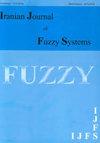基于不同类比和拉普拉斯求和算子的直觉模糊粗糙属性选择
IF 1.2
4区 数学
Q1 MATHEMATICS
引用次数: 1
摘要
在现实世界的数据洪流中,由于信息的不显著性和高维性,不相关和冗余的属性分别降低了专家预测精度和预测速度的能力。属性选择的概念是选择那些必要的、足以指定目标知识的属性。基于模糊粗糙集的方法在从高维数据集中选择相关且冗余度较低的属性方面起着至关重要的作用。基于直觉模糊集的方法可以处理不确定性,因为与模糊方法相比,它提供了额外的自由度。因此,对于处理信息系统中存在的模糊性和噪声,具有更加灵活和实用的能力。在直觉模糊粗糙集理论的基础上,利用不同类别比和拉普拉斯求和算子的概念,提出了两种新的鲁棒属性选择方法。首先,基于直觉模糊粗糙集概念,建立了基于不同类比和拉普拉斯求和算子的上下近似;此外,为了更好地理解我们的方法,我们提出了算法和说明性示例。最后,对一些实值数据集进行了属性选择和分类精度的实验分析。本文章由计算机程序翻译,如有差异,请以英文原文为准。
( 2005-5897) Different classes ratio and Laplace summation operator based intuitionistic fuzzy rough attribute selection
In real-world data deluge, due to insignificant information and high dimension, irrelevant and redundant attributes reduce the ability of experts both in predictive accuracy and speed, respectively. Attribute selection is the notion of selecting those attributes that are essential as well as enough to specify the target knowledge preferably. Fuzzy rough set-based approaches play a crucial role in selecting relevant and less redundant attributes from a high-dimensional dataset. Intuitionistic fuzzy set-based approaches can handle uncertainty as it gives an additional degree of freedom when compared to fuzzy approaches. So, it has a more flexible and practical ability to deal with vagueness and noise available in the information system. In this paper, we introduce two new robust approaches for attribute selection based on intuitionistic fuzzy rough set theory using the concepts of Different Classes ratio and Laplace Summation operator. Firstly, Different Classes ratio and Laplace Summation operator based lower andupper approximations are established based on intuitionistic fuzzy rough set concept. Moreover, we present algorithms and illustrative examples for a better understanding of our approaches. Finally, experimental analysis is performed on some real-valued datasets for attribute selection and classification accuracies.
求助全文
通过发布文献求助,成功后即可免费获取论文全文。
去求助
来源期刊
CiteScore
3.50
自引率
16.70%
发文量
0
期刊介绍:
The two-monthly Iranian Journal of Fuzzy Systems (IJFS) aims to provide an international forum for refereed original research works in the theory and applications of fuzzy sets and systems in the areas of foundations, pure mathematics, artificial intelligence, control, robotics, data analysis, data mining, decision making, finance and management, information systems, operations research, pattern recognition and image processing, soft computing and uncertainty modeling.
Manuscripts submitted to the IJFS must be original unpublished work and should not be in consideration for publication elsewhere.

 求助内容:
求助内容: 应助结果提醒方式:
应助结果提醒方式:


